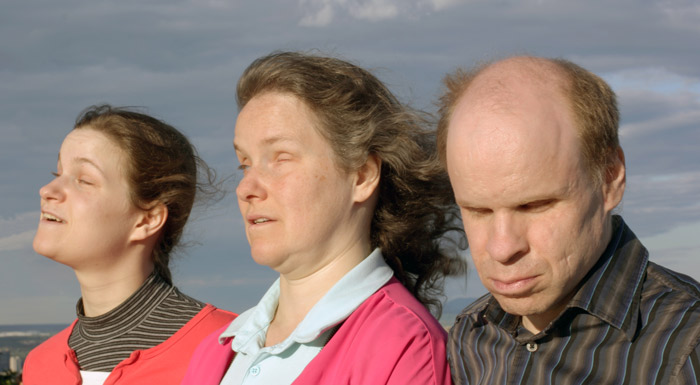On Sept. 22, Cinema du Parc opened showings for Resurrecting Hassan, a documentary of local interest. Directed by Chilean-Canadian filmmaker Carlo Guillermo Proto, Resurrecting Hassan tells the story of a Montreal family coping with the loss of a child. Unflinching and quietly compassionate, Proto’s film is an examination of grief, and the ways we look back and struggle to move forward. It is also a reminder that, unlike in movies, real life rarely provides a simple happy ending.
Resurrecting Hassan follows the lives of Denis Harting, Peggy Roux, and their adult daughter Lauviah. All three are blind, and they make their living by singing for donations in the Montreal metro. Their lives, however, seem to revolve primarily around Denis and Peggy’s second child, Hassan, who drowned in 2002 at the age of six. The family has falls under the sway of a Russian mystic Grigory Petrovich Grabavoy and his community of followers, who believe in organ regeneration as a way to reach immortality. Denis and Peggy decide to attempt the ultimate form of organ regeneration: Resurrection. As Peggy says with a wry grin, “Even the esoteric community isn’t so keen on the idea.”
The film moves slowly and quietly, doing its best to immerse its viewers into the family’s world of lonely metro stations and supernatural seminars. The Hartings are humorously engaging subjects, and their faces are very expressive. Proto is a perceptive cameraman, and the film’s best moments come when he captures off-hand moments of tenderness or beauty, such as Lauviah playing with the family cat. The scenes depicting performances in the metro are memorable, both for the power of the Hartings’ voices and because of the rare optimism they evoke.
As the film goes on and resurrection proves difficult, the faces of the family come to be animated less by laughter or hope and more by bitter argument. During a brutal shouting match, Proto’s camera remains unblinking, even though the viewers, like the bystanders in the metro, would prefer to avert their gaze.
The subtext in these arguments is the loss of Hassan, whose absence permeates every scene. The Hartungs are very open, reminiscing about the day he drowned and disarmingly wondering what age he’ll be when he returns to life. In their very preoccupation with Hassan, however, and their desperate faith that his resurrection will succeed, they reveal the force with which they are still feeling his loss, years later.
Real life does not always go in expected directions, and the same holds true for documentary films. Halfway through, Resurrecting Hassan takes a surprising turn when Peggy encounters a new love interest—Philippe, a blind Frenchman she meets in a supernatural WhatsApp group (she and Denis have an open relationship). Slowly, the film turns away from resurrection, and towards Peggy and Denis’ crumbling relationship, as Peggy begins a long-distance romance with Philippe, and Denis begins to fear living alone. Hassan’s presence is still felt, but more subtly; if the first part of the film is about mourning, the second half explores the prospect of moving on—or, rather, the failure to do so.
Resurrecting Hassan is a difficult movie, and it’s rarely enjoyable. It offers no easy answers. Rather than entertain, Proto wants to communicate the lived experience of his subjects: Grief and loneliness on the margins of Montreal society, and momentary redemption in the form of music or romance. He successfully paints a painfully real portrait of human loss and the way it quietly ripples across the months and years that pass.









“it’s rarely enjoyable”
Much like their caterwauling “singing.”
Does the McGill Tribune and / or Leo Stillinger and / or the theaters that criticize this film are aware that the director Carlo Proto is supposed to be a serious sexual, physical and psychological abuse of women? I wonder how these institutions think of providing a platform that strengthens its name and image in the lives of the many women who must exist in this city and be confronted daily with the trauma of the horrific and predatory abuse that this individual perpetrated against them. .. Shame. Especially with everything going on in pop culture at the moment with Harvey Weinstein and the #metoo campaign. We need to be much more careful about who were are featuring and supporting as to not further victimize the women this person preyed upon.